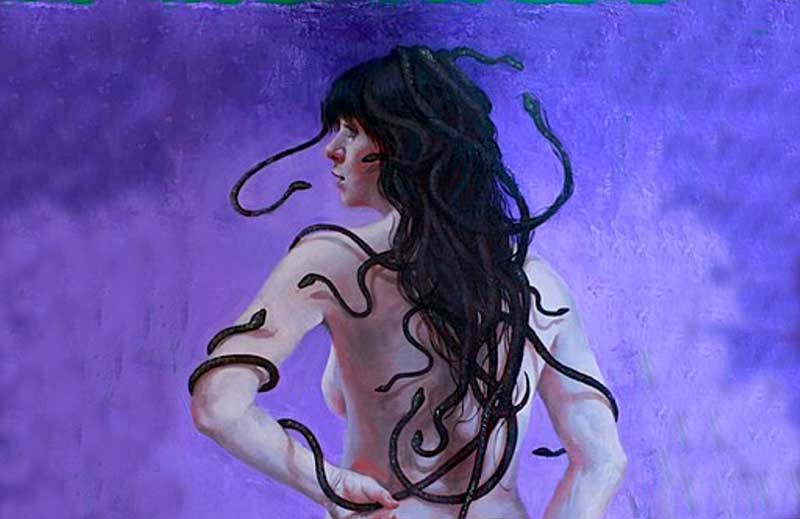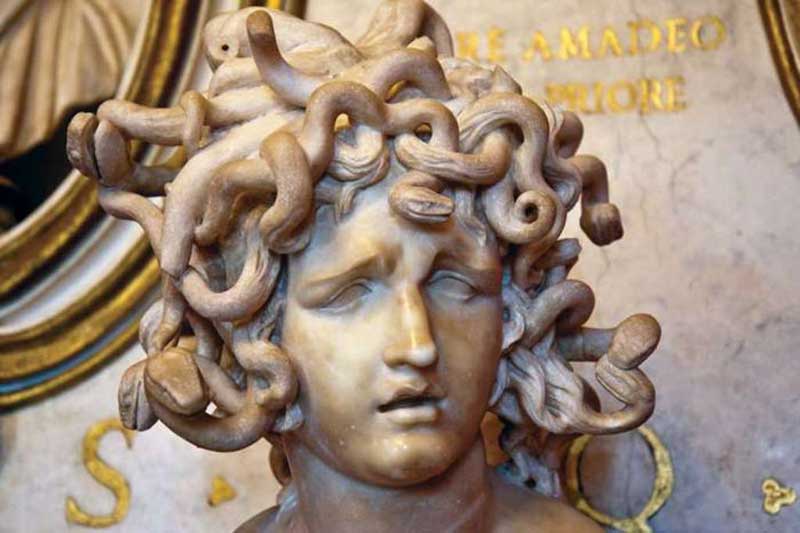
The story of the mythological creature Medusa is depicted in multiple works by the ancient Greek writers like, Homer, the fifth-century BC lyric poet Pindar, the eighth-century BC poet Hesiod, the ancient Greek tragedian Aeschylus, legendary historian Herodotus, the Roman poet Ovid and others, with a wide-range of variation and diverse picture. Although in the version of the Medusa myth related by the Roman poet Ovid, Medusa was originally a ravishing beauty, she is best known for her loathsome snaky-hair and her terrible ability to turn anyone to stone by her glance. While in some accounts, Gaia was named as her mother, according to Hesiod’s Theogony, Medusa was one of three Gorgon sisters born to Keto and Phorkys, primordial sea gods. She was the most beautiful among the sisters and the only one who was not immortal.
It is generally believed that Medusa was born at sea. However, there is controversy about her land of living. In the writings of the Greek poet Hesiod, Medusa lived close to the Hesperides in the Western Ocean near Sarpedon, but Herodotus the historian depicted Libya as her home.

According to the legends, Medusa was an exquisitely beautiful girl, whose crowning glory was her long and lovely hair. She was obsessed with her beauty and always liked to gaze lovingly at her reflection in the mirror, while combing her hair every now and again. During that time, Parthenon was the largest temple dedicated to the goddess Athena, decorated with amazing sculptures and paintings, which was adored by everybody.
However, when Medusa visited the temple for the first time, she felt that she would have made a much better subject for the sculptor than Athena had, as she was much prettier than the goddess. When she was busy gazing proudly at her own reflection in the large bronze doors of the empty temple, she suddenly saw the face of Athena reflected back at her, who told her that beauty fades swiftly in all mortals and it can neither comfort the sick, nor feed the hungry. After that, the goddess stripped off all her beauty and gave her the look of a snaky-haired hideous monster.

In another version of the story, the sea god Poseidon was irresistibly attracted by the divine and radiant beauty of Medusa and was determined to have sex with her. Finally, he raped her in the sacred temple of Athena. When the goddess came to know about the incident, she became furious at the desecration of her temple and instead of taking action against the rapist, she cursed the victim and transformed Medusa's beautiful hair to loathsome snakes, which made her face so terrible that the mere sight of it would turn onlookers to stone.

Medusa was killed by the great hero Perseus, which is one of the most thrilling stories in Greek mythology. According to the story, Danae, the daughter of the King of Argos, was impregnated by Zeus. However, as the king came to know by an oracle that he would be killed by his grandson, he sent the baby and Danae out to sea in a wooden chest. They were rescued by Dictys, a fisherman of the island of Seriphus, who raised Perseus like a son. But, when he grew up, Perseus was ordered by Polydectes, the king of Seriphus to bring him the head of Medusa, as he desired Perseus’ mother and wanted to get rid of her son.
As Perseus was the son of Zeus, the gods readily came forward to his help. He was equipped with a reflective bronze shield from Athena and a sword from Hephaestus, the god of fire and metalworking, before he sought out Medusa. Perseus avoided the direct look of Medusa by using Athena’s polished shield, as he only saw the reflection of her awful face, avoided her petrifying gaze and beheaded her with the divine sword.
